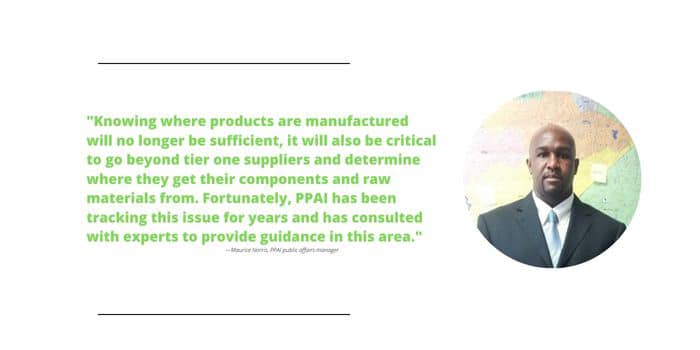The Uyghur Forced Labor Prevention Act (UFLPA) went into effect on Tuesday. The Department of Homeland Security has sent a report to Congress providing specific guidance to importers as required by the Act. This is in addition to operational guidance published by U.S. Customs and Border Patrol last week.
The law bans all imports from China’s Xinjiang province under the presumption that all goods from the area are produced with forced labor and imposes sanctions on foreign individuals responsible for forced labor in the region. It also includes a provision for importers to rebut presumptions that imported goods were produced with forced labor.
The Report:
The DHS report outlines the agency’s strategy for enforcing UFLPA, providing guidance to affected companies and identifying the known foreign entities CBP will be targeting while clarifying that the list is not exhaustive and CBP isn’t limiting their focus on the Xinjiang region.
DHS, in its role as chair of the Forced Labor Enforcement Task Force (FLETF), was required by the UFLPA to “develop guidance to importers on due diligence, supply chain tracing and management, and evidence to demonstrate goods were not mined, produced, or manufactured wholly or in part in the Xinjiang region of China or by forced labor.”
The report also includes the UFLPA Entity List which identifies organizations in Xinjiang, China that “that mine, produce or manufacture wholly or in part any goods, wares, articles and merchandise with forced labor.” The list shown on the DHS website starts on page 30 of the report sent to Congress.
A new law cracking down on Chinese forced labor could have major ramifications in the U.S. The law bans products from entering the U.S. if they have links to Xinjiang, where China has carried out a sweeping crackdown on Uyghurs and other minorities. https://t.co/8moc9sTZkU
— The New York Times (@nytimes) June 22, 2022
Promo Perspective:
The rebuttable presumption component of the UFLPA is of particular significance to companies in the promotional products industry. Many of its products are imported from China and it is incredibly difficult to prove that any product imported from China has no connections to Xinjiang.

“This is a significant development that Congress has been working on for over three years,” says Maurice Norris, PPAI public affairs manager. “Now that this bill has been signed and the relevant agency guidance has been published, the pre-existing movement toward companies in our industry and others being expected to provide ‘dirt-to-shirt’ information on their products has now been made official. This means industry companies will have to delve deeper into their supply chains than ever before.
“Knowing where products are manufactured will no longer be sufficient, it will also be critical to go beyond tier one suppliers and determine where they get their components and raw materials from. Fortunately, PPAI has been tracking this issue for years and has consulted with experts to provide guidance in this area. We have numerous webinars offers a wealth of information and resources to help companies dig deeper into their supply chains and avoid the presence of forced labor.”
PPAI has prepared conducted several education resources to help with supply chain mapping. These include:
- Supply Chain Mapping And Traceability
- A Tour Through The Global Cotton Supply Chain
- Supply Chain Problems In Xinjiang
Implementation:
CBP’s 2023 budget requests $70.3 million to enforce UFLPA. The budget includes 300 new positions, and the expected performance is to:
- Increase of over 11.5 million shipments and subsequent transactions estimated across all tariff codes at ports of entry.
- Increase of petitions under the presumption is anticipated to reach over 20,000 annually. Implementation of the presumption will likely exacerbate current supply chain disruptions.
- All imports, including those from outside China, will be subject to delays in processing time because CBP will have to allocate its resources across a significantly larger number of imports.
- Increased volumes of detention and seizures will affect ports across the country.


